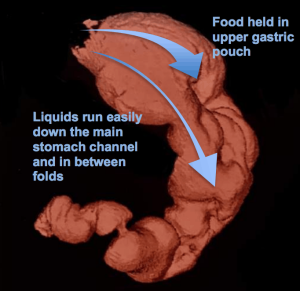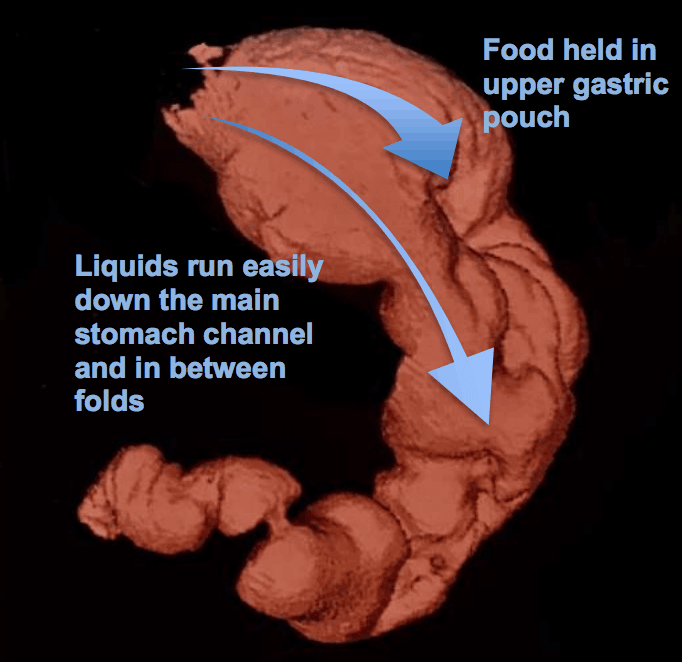Bariatric surgery has become increasingly popular over the last few decades as a result of the rise in obesity around the world. Surgery such as gastric bypass, sleeve gastrectomy and gastric banding are the most popular types of bariatric surgery due to the impact they have on a patients long-term weight loss. However not everyone likes the idea of having surgery and for this reason it seems that the more options we have available, the more likely it is that people will find something that suits them. It has been some time since new procedures have been added to the mix – we have had endoscopic procedures for diagnosis and treatment of cancers and other conditions, however endoscopic weight loss treatments haven’t taken off in Australia because they have been expensive and temporary. The Endoscopic Sleeve Gastroplasty is the first endoscopic weight loss surgery that has a real chance of offering people durable weight loss without requiring abdominal incisions.
What is Endoscopic Sleeve Gastroplasty?
Endoscopic Sleeve Gastroplasty (ESG) uses an endoscope (a tube with a camera attached which is inserted orally down a patient’s throat) as opposed

Endoscopic Sleeve Gastroplasty
to making incisions to perform the surgery. ESG works by partitioning the stomach into a slowly emptying upper part and a normally functioning lower part. This will reduce the gastric volume of the stomach by up to 50 – 60% as well as alter the way that the stomach functions.
Although ESG carries the same level of risk as the other types of bariatric surgery such as Sleeve Gastrectomy, it does avoid removal or stapling the stomach. Often patients can leave hospital on the same day following ESG, unlike other options that can result in longer hospital stays. For patients without health insurance ESG is also cheaper in cost when compared to other more extensive bariatric surgery types.
Does Endoscopic Sleeve Gastrectomy work?
Although this is a relatively new procedure when compared to other forms of bariatric surgery, the results so far are promising. Endoscopic Sleeve Gastroplasty can lead to significant weight loss, but of course the amount of weight you lose will always depend on the changes you make to your lifestyle following surgery.
A recent study of people with an average BMI of 38, found that ESG led to an average weight loss of around 18kgs 6 months post-op. At a higher BMI of around 45, ESG resulted in an average weight loss of 33kgs 6 months post-op. The ESG itself does not make you lose weight, but it is a tool to help restrict the amount of food you eat by affecting your hunger, capacity and the rate at which you consume food. Due to a smaller stomach size, patients find that after eating a much smaller quantity of food than usual they have a feeling of satisfaction (or that they have eaten enough). Furthermore, it seems that solid food leaves the stomach more slowly which helps prolong appetite suppression between meals.
As with other forms of bariatric surgery, ESG may also improve conditions related to being overweight such as:
- Heart disease.
- Type 2 diabetes
- High blood pressure
- Sleep apnea
- Gastroesophageal reflux
 Endoscopic Sleeve Gastrectomy at Upper GI Surgery
Endoscopic Sleeve Gastrectomy at Upper GI Surgery
At Upper GI Surgery we are now offering our patients ESG as a surgical option if they are eligible for bariatric surgery. With all of our surgical procedures you will first need to meet with one of our doctors/surgeons to discuss the best possible option for your surgery. If you are interested in learning more about ESG click here to read more on our website, or if you are interested in speaking to us about weight loss surgery then you can contact our team on 02 9553 1120 or submit an enquiry online.
4 Comments
Submit a Comment



If you’ve already had the sleeve gastrectomy I this new procedure an option?
For any person with weight regain after a bariatric procedure the reasons for weight regain need to be established. If someone is eating large meals then adding a degree of ‘restriction’ to their original surgery may help, but often its snacking rather than big meal eating that leads to weight regain in which case restriction won’t really work.
The ESG can be used to add restriction to a sleeve, however the restriction won’t be permanent as the sutures will fall out eventually. What most people need isn’t just an operation but a discussion about what barriers exist to achieving and maintaining weight loss and then a tailored and individualised approach.
Many people are able to lose weight with combination of “getting on track” and some of the new weight loss meds, others will need/want surgery and then the options vary between creating a lower volume sleeve, a gastric or mini-bypass or a loop duodenal switch.
inquiring about ESG procedure costs for uninsured patients
Hi Mary
Thanks for reaching out. If you can please send us your details tp info@uppergisurgery.com.au then we can see what we can do to help.
Thanks